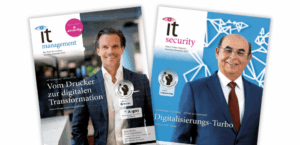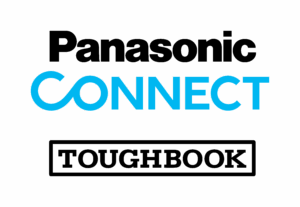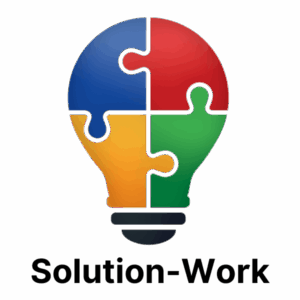How do project managers increase the productivity of their teams sustainably and without creating stress? Three smart questions help you to delegate correctly. You strengthen the self-organization and continuous learning of your employees.
Sometimes we can manage a project professionally for a whole day and use all the best practices to achieve a result that could have been achieved in just a few minutes. All of this depends crucially on whether or not we can rely on our employees to organize themselves.
Here is a simple example that I have often experienced: At large conferences, many hundreds of people sit around large tables and chairs listening to a speaker, and free space is scarce. In an interactive part, everyone has to be able to form and rearrange groups quickly. The speaker therefore asks all participants to place the tables on the right-hand side of the room and the chairs on the left.
The participants look at each other before rising quietly. The stronger ones start to lift the tables, while the others take one or two chairs and stack them on the other side. If necessary, queues form and people help each other. In less than two minutes, all the work is done because everyone has organized themselves. Nobody had to tell them what to do. You find out for yourself and take action. Communication and decisions take place simultaneously in the room where they are needed; everyone coordinates with each other.
Imagine how much coordination would be required to professionally manage this process of rearranging chairs and tables:
- How long would it take to work out the plan and the various instructions to be given to people? For example, physical impairments should be taken into account.
- How do you distribute all these instructions quickly? How do you manage conflicts, e.g. if someone wants to finish stacking their table first?
- How would you measure progress?
If we wanted to, we could spend a whole day managing and coordinating.
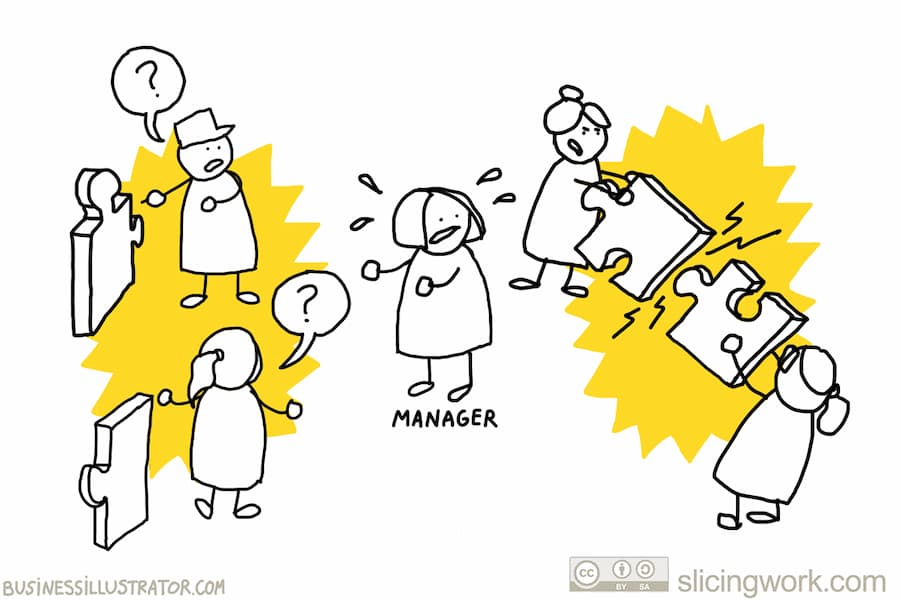
Admittedly, most professional projects are more complicated than moving chairs and tables. And yet they can significantly increase productivity by taking advantage of self-organization.
If you systematically ask yourself these three questions when you delegate work, you can significantly reduce overheads and increase your teams’ personal responsibility.
1st question: What will I observe (see, hear, read) when the work is done?
When you delegate work, the most important and often most time-consuming part of the task is communicating the expected outcome of the work. Delegate results, not to-dos. It is also important to explain why this result is important, but the why alone is not enough.
Imagine that the moderator in the example above had said to the participants: “Please make sure that the room has enough space so that you can form groups of nine people within fifteen seconds.” Sounds like a nice, clear goal, doesn’t it?
But what does this goal mean for each individual? Before anyone can do anything, all these hundreds of participants have to agree on the same end result. This can take a while. But if each person knows what the end result looks like, they can find out for themselves what they can contribute. This also makes it possible to be proud of your own work, learn from mistakes and improve your own skills.
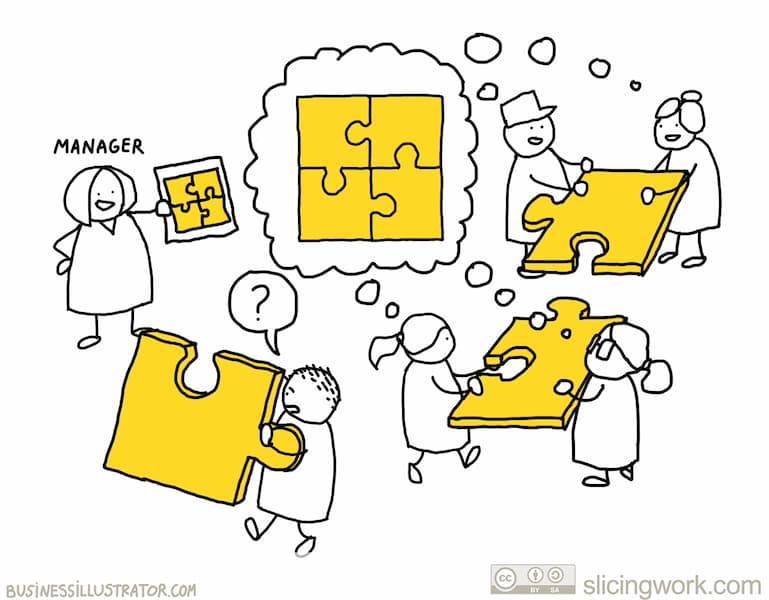
The next time you delegate a similar task to the same person or team, you have a counterpart who thinks along with you and benefits from your own learning curve. Conversely, if this is the first time that you as a manager have delegated such a result and you may not be prepared to entrust the entire result to someone else for good reasons, you can help. However, it is then important that you really only provide support and leave the main responsibility with the team or the person to whom you have delegated.
2nd question: What should my colleagues learn in the long term?
What receives feedback is improved.
Make sure that the result you demand from your employees is what you want them to master in the long term.
Let’s assume you manage the sales department of a book retailer. If you ask your team to research potential new clients, they will learn to research better through constructive feedback. If you ask them to make ten appointments with managers of small to medium-sized bookstores, they will have to build up knowledge in a much larger, more holistic area of work: Research, presentation, approach, persuasion.
Ultimately, you could also instruct us to carry out everything up to the final sale. However, there is then the risk of overburdening them with responsibility so that they end up not learning and the sale doesn’t go through. Finding the right balance of challenge and ability is challenging and also exactly why you are the more experienced manager.
See it as your task to continuously develop the skills of your team so that they can deliver more and more holistic results.
3rd question: Which result is “just big enough” to be judged?
It is important to delegate results that can be completed and assessed within a few days or weeks.
If the feedback comes too late, we generally don’t learn. The information just doesn’t stick, we can’t connect it to our actions that led to the result.
Imagine you are learning to play the piano and have to wait fifteen minutes to hear the sound of the keys you have struck. How well would you learn? Fifteen seconds later is hard enough. Fifteen minutes? Impossible.
The renowned author and Nobel Prize winner Daniel Kahneman put it this way in his book “Thinking, Fast and Slow”: “Whether professionals have the chance to develop intuitive expertise depends largely on the quality and speed of feedback and sufficient opportunities to practice.”
Kahneman describes the difference using the example of anesthesiologists and radiologists. The first of these is the continuous monitoring of a patient’s body values during surgery within minutes of administering a drug if their heartbeat slows down too much or their blood pressure jumps. In this way, they can quickly learn to develop a good intuition for their specialist area. In contrast, radiologists may only know months or even years later if they have overlooked an important detail or even a disease when looking at the X-ray images. It was difficult for them to learn quickly.
In many types of work, it is quite easy to control the outcome of the work you delegate. In the sales example above, for example, instead of “10 agreed appointments with…” you could only formulate “2 agreed appointments with …” as a task.
In larger projects, however, this downsizing of the results is not so easy. Here it is important to learn how to cut the work in such a way that it still produces valuable assessable results. This skill is known as “slicing work”.
Conclusion
It is best to delegate observable results that are as holistic as possible for your teams and that can be delivered and assessed within weeks or, even better, days.
It may not seem easy at first. The good news is that as soon as you ask yourself these three questions regularly, you will get better at them very quickly.
And the resulting skills will pay off a hundredfold for you personally and your teams.
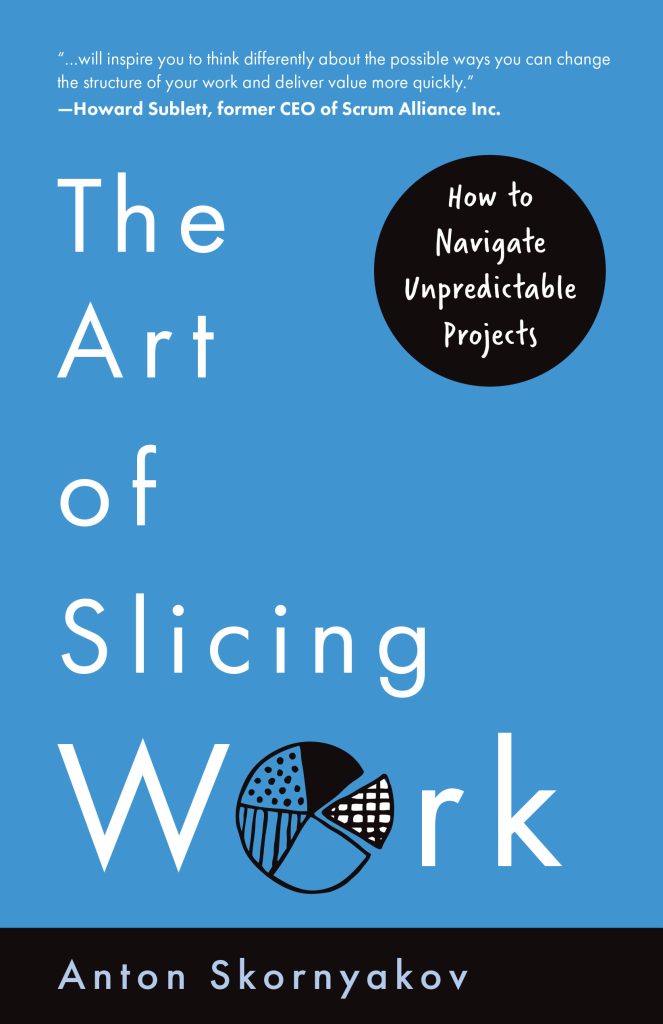
The Art of Slicing Work: How to Navigate Unpredictable Projects
If you ignore a problem, it will not go away.
And yet this is exactly what most organizations do when an unpredictability arises. Why not work with unpredictability instead of fighting it?
In “The Art of Slicing Work”, Anton Skornyakov shows how to deal with unpredictability and focus on achieving important results. The aim is to achieve steady and controllable progress, create a sense of shared responsibility and maximize the value of the work produced.
The book is a practical guide with little jargon, filled with stories, explanations and lessons developed and refined through years of organizational coaching. The Art of Slicing Work (March 2024) will be available at Amazon, Barnes & Noble, and wherever books are sold.

